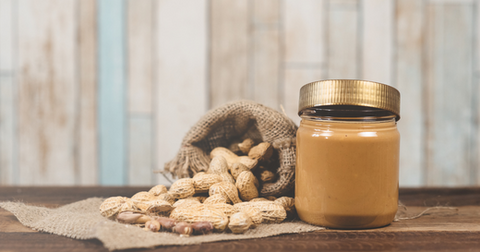Introduction
Managing diabetes often feels like a balancing act—finding foods that stabilize blood sugar, provide satiety, and satisfy your taste buds can be a challenge.
Surprisingly, peanut butter might just be the solution you're looking for. Packed with essential nutrients, peanut butter not only helps manage diabetes but also supports heart health. In this blog, we’ll explore the seven proven benefits of this simple yet powerful spread and provide practical tips for incorporating it into your diet.
7 Ways Peanut Butter Supports Your Diabetes Diet and Heart Health
1. Stabilizes Blood Sugar Levels
Peanut butter is rich in protein, fiber, and healthy fats, which work together to slow the absorption of sugar and prevent blood sugar spikes. Its low Glycemic index (GI) of 14 ensures that sugar is released gradually into the bloodstream, offering consistent energy without the rollercoaster effect of high-GI snacks.

2. Reduces Cravings for Sugary Snacks
The protein and healthy fats in peanut butter promote satiety, keeping you full for longer and reducing cravings for less healthy, high-sugar snacks. This makes it a great option for curbing hunger while maintaining steady blood sugar levels.
3. Supports Weight Management
For individuals managing diabetes, weight management is crucial. Peanut butter's nutrient profile helps control appetite and reduces the tendency to overeat, aiding in maintaining a healthy weight.
4. Promotes Heart Health
Heart health is a top priority for diabetics, and peanut butter delivers on this front too. Its healthy monounsaturated fats help maintain good cholesterol (HDL) levels, reduce triglycerides, and lower the risk of cardiovascular disease when consumed as part of a balanced diet.

5. Provides Long-Lasting Energy
The combination of low GI, protein, and fats in peanut butter ensures a steady release of energy throughout the day. This makes it an excellent choice for snacks or meals that keep you going without sudden energy crashes.
6. Easy to Incorporate into a Diabetes-Friendly Diet
Peanut butter is versatile and easy to include in meals and snacks. Spread it on whole-grain toast, dip veggies or apple slices, stir it into oatmeal, or blend it into a smoothie with low-GI fruits like berries. Just stick to 1–2 tablespoons per serving to avoid calorie overload.
7. Offers a Nutritional Punch with Minimal Ingredients
Quality peanut butter is a nutritional powerhouse when chosen wisely. Opt for natural, minimally processed peanut butter with no added sugars or hydrogenated oils. Organic options can further minimize exposure to pesticides, ensuring you get all the benefits without unnecessary additives.

5 Peanut Butter Myths: Diabetes and Heart Health
Myth 1: Peanut butter is too fatty for diabetics.
Truth: Not all fats are bad! Peanut butter is rich in heart-healthy monounsaturated fats, which can help improve cholesterol levels and reduce the risk of heart disease—a common concern for diabetics. When consumed in moderation, these fats also contribute to satiety, making it easier to manage hunger and blood sugar levels.
Myth 2: Peanut butter causes blood sugar spikes.
Truth: Peanut butter has a low glycemic index (GI) of 14, meaning it does not cause rapid blood sugar spikes. Its combination of protein, healthy fats, and fiber slows digestion and promotes gradual sugar release into the bloodstream, making it a great option for maintaining steady blood sugar levels.
Myth 3: All peanut butter is healthy for diabetics.
Truth: Not all peanut butter is created equal. Many commercial brands contain added sugars, salt, and hydrogenated oils, which can be harmful for diabetics. The healthiest option is natural peanut butter with minimal processing—just peanuts and a pinch of salt, with no added sugars or unhealthy fats.
Myth 4: Peanut butter is too high in calories for diabetics to eat regularly.
Truth: While peanut butter is calorie-dense, it can still be a healthy part of a diabetic diet when consumed in moderation. The protein, fiber, and healthy fats in peanut butter make it highly satisfying, helping to control hunger and reduce overall calorie intake throughout the day. Stick to a serving size of 1–2 tablespoons to enjoy its benefits without overdoing it.
Myth 5: Peanut butter is bad for heart health because it contains fats.
Truth: The fats in peanut butter are predominantly monounsaturated and polyunsaturated fats, which are heart-healthy fats that help reduce bad cholesterol (LDL) and increase good cholesterol (HDL). These fats are beneficial for maintaining cardiovascular health and reducing the risk of heart disease. However, it's essential to choose natural peanut butter without added hydrogenated oils or sugars to maximize these benefits.
Conclusion
Peanut butter isn’t just a delicious spread; it’s a versatile, nutrient-packed food that offers proven benefits for managing diabetes and supporting heart health. By choosing the right kind and incorporating it into your diet thoughtfully, you can enjoy its many advantages while staying on track with your health goals.
Let this simple spread become a staple in your kitchen—because managing diabetes and heart health doesn’t have to be complicated!
General FAQs About Peanut Butter
Q- Can diabetics eat peanut butter every day?
A- Yes, diabetics can enjoy peanut butter daily in moderation. But always concern your Doctor first and Stick to 1–2 tablespoons of natural peanut butter without added sugars to maintain stable blood sugar levels.
Q- What type of peanut butter is best for diabetics?
A- Natural or minimally processed peanut butter with no added sugars or hydrogenated oils is the best choice for diabetics.
Q- Are there any side effects of eating peanut butter for diabetics?
A- Overconsumption of peanut butter can lead to excess calorie intake, which may affect weight management. Additionally, some brands may have added sugars that can impact blood sugar levels. Always read the label of the product and check the ingredient's.
Q- Is peanut butter better than other spreads for diabetics?
A- Peanut butter is often better than high-sugar spreads like jams or chocolate spreads due to its low GI and high nutritional content, but choosing the right brand and natural Peanut Butter is crucial.








Comments (0)
There are no comments for this article. Be the first one to leave a message!